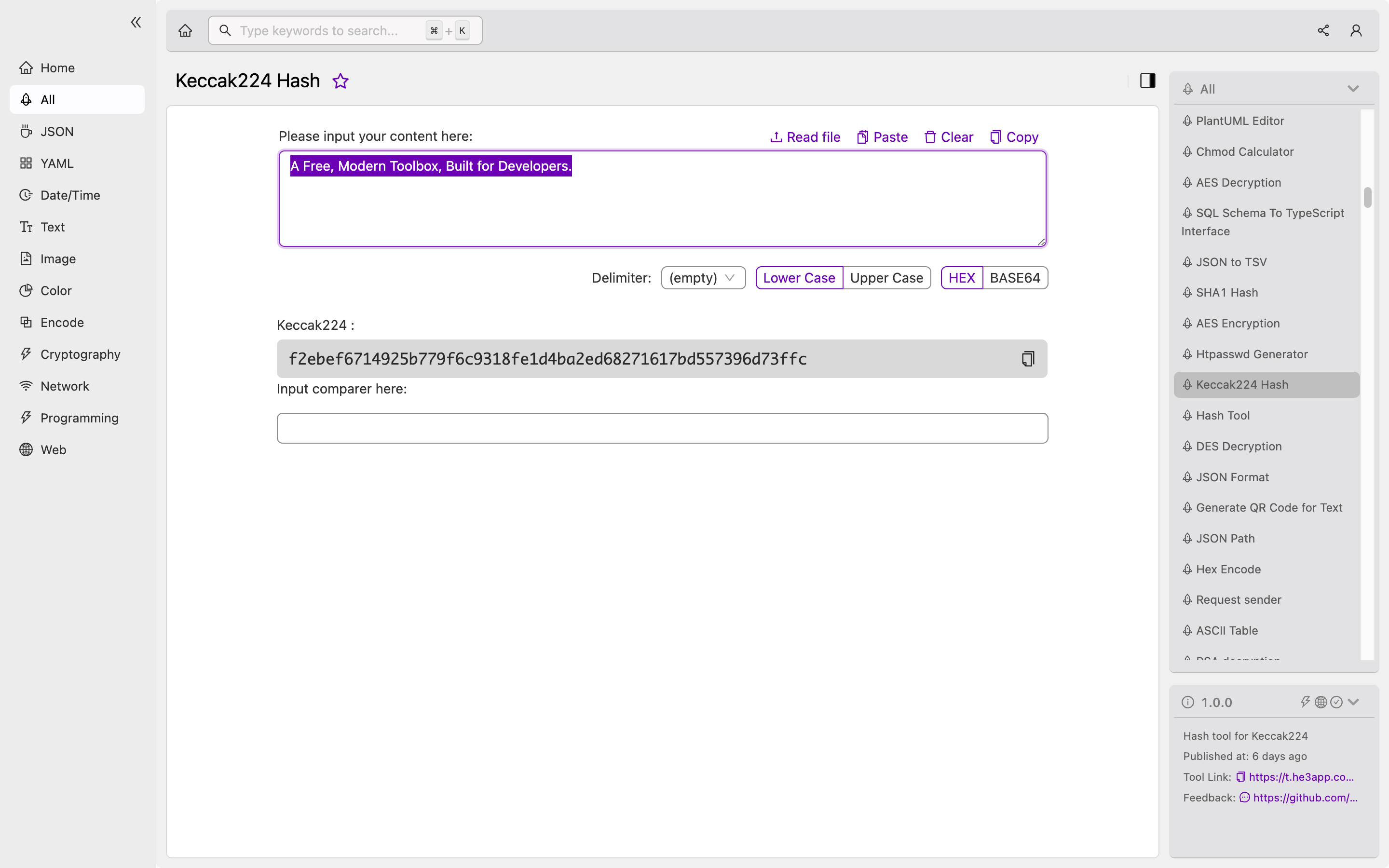Introduction
In cryptography, a hash function is one of the most important tools for data security. A hash function takes arbitrary-size inputs (often strings) and produces fixed-size outputs (often unique fixed-length string values), commonly known as hash values, hashes, or message digests. Keccak224 Hash is an example of a secure hash algorithm that provides strong security and simple implementation.
What is Keccak224 Hash?
Keccak224 Hash is a cryptographic hash function that belongs to the family of Keccak algorithm hash functions, which were finalized as SHA-3 by NIST in 2015. Keccak224 Hash generates a 224-bit hash value by transforming a message into a fixed-size output of 28 bytes. Keccak224 Hash is a pure and sponge-based hash algorithm that ensures security properties like collision resistance, preimage resistance, and second preimage resistance.
How Keccak224 Hash Works
Keccak224 Hash is a cryptographic sponge function that follows the Keccak framework. The Keccak framework uses a repetitive hashing process (squeezing and padding) based on a permutation function of a particular block size. Keccak224 Hash uses a small block size (1600 bits) and a variable output size (chosen from a pre-defined list).
To be more precise, Keccak224 Hash applies the following steps:
- Padding: Keccak224 Hash pads the message and appends a ‘1’ bit to the end of the message. It then appends ‘0’ bits until the length of the padded message is congruent to 888 modulo 1600 bits.
- Absorbing: Keccak224 Hash applies the sponge function to the padded message. The sponge function is based on an internal permutation (Permutation F). It applies the Permutation F to the first block of 1600 bits of the message and XORs this output with the second block of 1600 bits of the message. It repeats this process until the whole message is absorbed.
- Squeezing: Keccak224 Hash squeezes a fixed sized output of 28 bytes (where each byte consists of 8 bits) from the sponge function.
Scenarios for Developers
Developers use Keccak224 Hash for various use cases, including verifying the integrity of files, digital signature, and authentication protocols. Keccak224 Hash is used in blockchain applications, as it provides secure, unique, and tamper-proof hashing for blockchain transactions. Here is a sample code of Keccak224 Hash in Python:
import hashlib
message = b"Hello World!"
hash_value = hashlib.sha3_224(message).hexdigest()
print("The hash value is:", hash_value)Key Features of Keccak224 Hash
Keccak224 Hash has several key features, some of which are listed below:
| Features | Description |
|---|---|
| Speed | Keccak224 Hash is faster than most other popular hash functions. |
| Security | Keccak224 Hash offers strong security against collision attacks, second pre-image attacks, and pre-image attacks. It is designed to offer secure cryptographic hash functions with a high degree of protection against all known cryptanalytic techniques. |
| Simplicity | Keccak224 Hash offers simplicity of compression functions and sponge constructions. It can be implemented in a small amount of code with minimal hardware and software implementations. |
| Flexibility | Keccak224 Hash offers the flexibility of producing different hash sizes (224, 256, 384, 512) by adjusting the squeezing phase. |
Misconceptions and FAQs
Misconception: Keccak224 is SHA-3
Although Keccak was initially designed as a competing hash function for the NIST hash standardization process known as SHA-3, Keccak224 Hash is an independent function that generates 224-bit hash values. Keccak224 Hash is a variant of the Keccak family of hash functions.
FAQ 1: Is Keccak224 Hash more secure than SHA-256?
The security of a cryptographic hash function depends on a combination of factors, including the design, implementation, and usage scenarios. Both Keccak224 Hash and SHA-256 are secure cryptographic hash functions that offer good resistance against known attacks. Keccak is faster than SHA-256 and uses a smaller amount of code.
FAQ 2: How is Keccak224 Hash different from SHA-3?
Keccak is the family of hash functions that contains Keccak224 Hash. In comparison, SHA-3 is the standardized version of Keccak that includes four specific members with fixed output sizes (SHA3-224, SHA3-256, SHA3-384, and SHA3-512). Keccak supports varying output sizes, while SHA-3 pre-set four output sizes.
Conclusion
Keccak224 Hash is a secure and efficient cryptographic hash function that delivers strong security properties, simplicity, and flexibility. Developers can use Keccak224 Hash for secure data hashing, blockchain transactions, and other cryptographic applications. Keccak224 Hash is easy to implement and provides fast performance compared to other popular cryptographic hash functions.
Or you can use Keccak224 Hash tool in He3 Toolbox (https://t.he3app.com?cj16 ) easily.

References
“Keccak (Standard SHA-3).” Wikipedia, the free encyclopedia. https://en.wikipedia.org/wiki/SHA-3#Keccak
“Keccak Implementation Overview.” Keccak Team. https://keccak.team/implement.html
“SHA-3 Standard: Permutation-Based Hash and Extendable-Output Functions.” NIST Computer Security Resource Center. https://csrc.nist.gov/publications/detail/fips/202/final